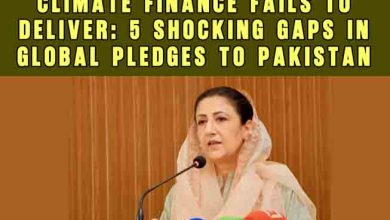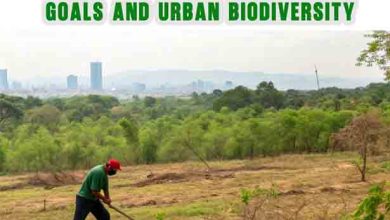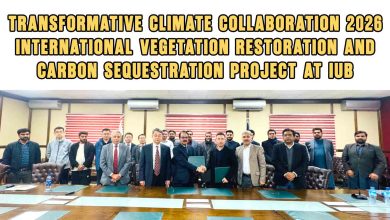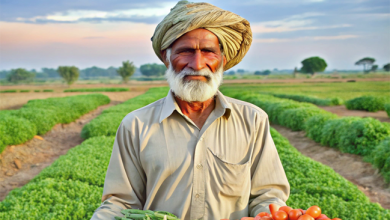Valuing wetlands
THE scale of last year’s floods in Pakistan would have overwhelmed a developed country, let alone a developing one. Glacial melt and unexpectedly heavy rainfall attributed to climate change triggered the #floods. The ecosystems that should have served as a natural barrier against environmental disasters were too damaged to prevent the catastrophe.
#Wetlands are an important component of the Earth’s ecosystems, providing myriad benefits. In addition to slowing down global heating and capturing carbon, they remove and filter pollutants from water.
#Groundwater levels, especially in #Asia and #Africa, have declined due to over-extraction and GlobalWarming. By retaining floodwaters, wetlands help maintain healthy levels of groundwater; by percolating deeper, they replenish aquifers. Unfortunately, the crucial role of these often unsung heroes of the natural world has not received due recognition.
Considered by many as ‘unproductive land’, wetlands have been drained and reclaimed mostly for agriculture and development purposes. According to the Intergovernmental Platform on Biodiversity and Ecosystem Services, 85 per cent of wetlands present in 1700 were lost by 2000. A recent study published in Nature found that seven major drivers were responsible for this declining trend, which has accelerated since 1900 — conversion to croplands accounts for 61.7pc of the total loss; other human activities perceived as more ‘productive’ include farming, development and forestry.
-
Wetlands are vanishing three times faster than forests.
#Wetlands are vanishing three times faster than forests. This is deeply worrying for billions of people who depend on them for their livelihood. The Global Wetland Outlook notes that more than 4bn people rely on wetlands for their livelihood and well-being. The production of rice, animal fodder, timber, medicinal plants, stems and leaves for weaving and fisheries would take a big hit if wetland loss is not reversed.
#Biodiversity is another victim of the loss of these precious ecosystems. Forty per cent of all plant and animal species live or breed in wetlands, which are also a feeding and breeding ground for migratory birds. IUCN confirms that wetland species are going extinct more rapidly than terrestrial or marine species — almost one-third of all freshwater biodiversity faces extinction due to pollution and habitat loss.
For arid climates like Pakistan’s, nature-based solutions and ecosystem-based approaches offer effective solutions against environmental challenges. Wetlands are critical for connecting floodplains and linking other parts of the water cycle, including lakes and streams, as a safeguard against floods. Draining wetlands can deprive people of livelihoods, displace wildlife and disrupt the delicate balance of the watershed system, leading to effects such as lowering the water table and soil precipitation.
The #IndusRiverBasin is at risk — the lifeline of this agrarian country, which is already suffering the worst effects of climate change, nature loss and pollution and waste. The unique desert wetlands of #Achro #Thar in #Sindh is a collection of around 100 lakes spread over 4,800 square kilometres. Due to global warming and ineffective management, these lakes are shrinking. Similarly, ecosystems in KP have suffered severe harm as untreated chemical and toxic effluents from the marble, leather and other industries are discharged directly into tributaries that flow into the wetlands.
To minimise loss and reduce risks from floods and other natural calamities, Pakistan needs long-term, context-appropriate and broad-based strategies and actions for ecosystem restoration.
It is imperative to supplement the ‘hard-engineering approach’ of building dykes and drains with ‘soft-engineering’ by conserving existing wetlands and reclaiming drained wetlands. The country’s elaborate network of rivers and their tributaries will especially benefit from a sound ecosystem that provides economic and social dividends to the large population dependent on it, while allowing biodiversity to thrive.
‘Living Indus’, Pakistan’s umbrella environmental initiative, prioritises several action areas for protecting and restoring the Indus River basin ecosystem, primarily through nature-based interventions. This ambitious plan has the potential to recharge the country’s ecosystem for development and eradication of poverty in line with the SDGs.
On the #global front, conserving wetlands is a key part of the work that must be done in the ongoing UN Decade on #Ecosystems Restoration and under #UN resolutions. #SDG-6 commits governments to protecting and restoring wetlands by 2030. #UNEP supports countries to sustainably manage freshwater ecosystems. It is time to scale up these efforts by valuing Earth’s wetlands.
The writer is director of intergovernmental affairs, United Nations Environment Programme.
Published in Dawn, March 7th, 2023







